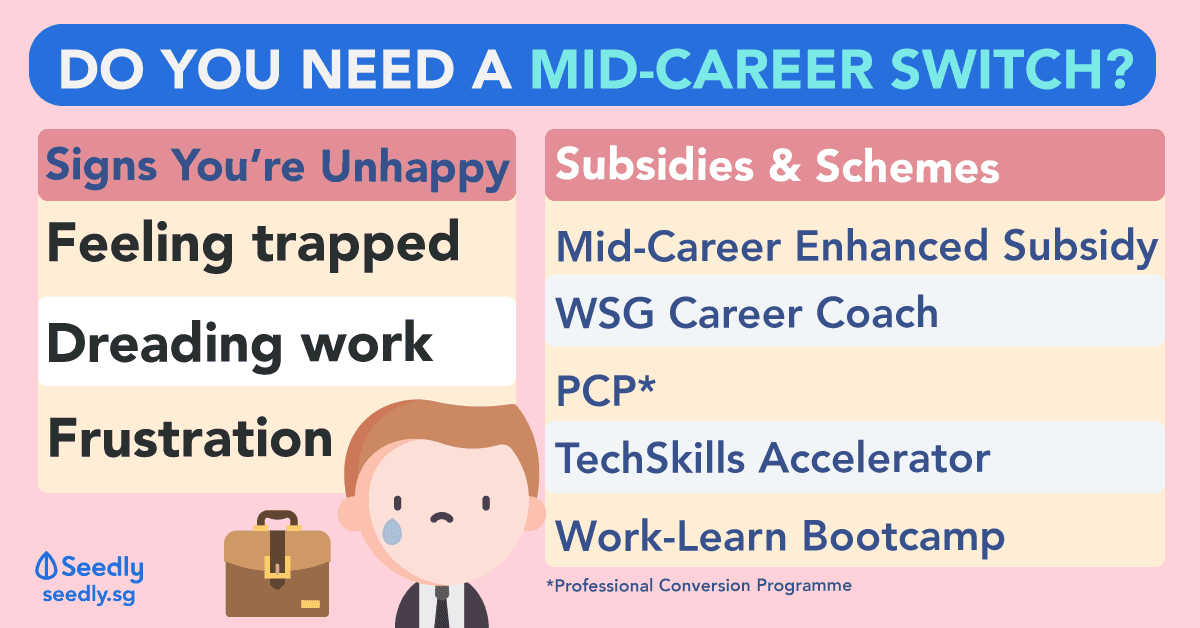It’s easy to stick to what feels comfortable. The routine, the financial security from a modest pay check, the monthly presentations. Ah, fun times.
Except…there’s a niggling feeling you’ve been repressing for awhile now.
Yep, you just aren’t happy.
If it’s anybody’s guess — and I’ll take a stab at it — it’s thanks to your job.
It may just be the millennial in me, but what’s the point in suffering if you feel dead on the inside?

Do You Need A Mid-Career Switch?
Singapore is the 34th happiest country in the world, according to the World Happiness Report 2019.
Now, I’m not about to dispute that.
If you’ve been feeling unsettled of late, though, consider the following before making any drastic decisions.
Signs Of Job Dissatisfaction
While it isn’t uncommon to occasionally feel unhappy with your job, these are red flags to look out for – some of which I’ve myself experienced:
- Perpetual frustration
- Feeling trapped, jaded or helpless
- Complaining (in excess) about your job and/or bosses
- Dreading going to work
- Asking yourself all too often: “What’s the point?”
- Trawling job portals at work/over lunch/24/7
If you’re mmm hmm-ing in grateful agreement, then great!
We’re about to arm you with some excellent tips on how to make a mid-career switch.
Other Factors To Consider
Before nosediving into quitting your job, take the time to consider the following:
- What industry do you plan to go into?
- What skills can you bring to the industry?
- Always think about the value you add to your potential new role.
If you’ve 20 years’ experience in project management, you may be suited to a similar job outside your sector.
- Always think about the value you add to your potential new role.
- Do you have the funds to support your career switch?
- Ideally, you’ll need at least six months’ savings to tide you by.
- What’s your end goal?
- For instance, if you’re hoping to jump into digital marketing, do you hope to eventually run your own agency?
- Are you prepared to start from the bottom?
The final question’s a big one, and really about going in with the right mindset. That’s because there’re plenty of fish in the sea – fresh grads, interns, and mid-career switchers like yourself.

You may have to take a pay cut or a more junior role.
Being receptive to suggestions from younger colleagues is equally important; there’s something to be learnt from anyone and everyone.
Top Industries To Work In
It can be hard guessing which industry to take a crack at, especially if you haven’t adequate experience in a particular field.
As a starting point, we’ve highlighted five job industries in Singapore worth considering.

Within the next three years, at least 9,000 healthcare-related jobs will be created in hospitals, eldercare centres and polyclinics.
Roles include:
- Physiotherapist
- Diagnostic radiographer
- Nurse
Digital Media and Infocomm Technology
Like it or loathe it, the digital future is upon us – and with it, a myriad of roles to keep our smart nation flourishing.
Roles include:
- Software developers
- Content Strategist/SEO Specialist
- System Administrators
Banking and Finance
Much like the healthcare sector, expect thousands of jobs to be added to the Banking and Finance industry within the next few years.
Roles include:
- Cyber Security Specialist
- Operations Analyst
- Project Manager
Human Resources
Where would we be without our trusty HR colleagues? If you rise up the ranks, your compensation could be as much as $220,000 annually.
Roles include:
- Shared Services Lead
- HR Director
- Talent Acquisition Manager
Wholesale Trade
This sector revolves around the B2B purchase and sale of goods.
Singapore’s economy relies heavily on international trade, so you can be sure a career in this industry will give you the growth you may be looking for. By 2020, some 10,000 jobs will be added to the Wholesale Trade industry.
Roles include:
- Data Analyst
- Market Analyst
- Business Development roles
Wondering about remuneration?
Check out our comprehensive salary guide!
Subsidies, Schemes And Career Guidance
Switching careers shouldn’t eat into your savings; at least, not excessively.
There’re a handful of schemes for mid-career Singaporeans, several of which offer industry attachments.

Professional Conversion Programme (PCP)
Designed for Professionals, Managers, Executives and Technicians (PMETs), PCP helps train employees for redeployment within the same company.
Alternatively, the programme also offers attachments to industry partners.
Each PCP cycle typically runs for three to 24 months. View its full host of programmes here!
SkillsFuture Singapore
We all know ’bout SkillsFuture credits, but let’s not forget its programmes for mid-career switchers.
If you’re one of those lifelong learner-types (hi, dad), hone in on SkillsFuture Mid-Career Enhanced Subsidy, which offers up to 90% off industry-relevant courses.
Here’s a quick breakdown of some schemes and grants to know:
| Recommended Programme | Ideal For |
|---|---|
| TechSkills Accelerator (TeSA) | ICT and non-ICT professionals (both fresh- and mid-career) |
| Work-Learn Bootcamp | Fresh grads and mid-career Singaporeans |
| SkillsFuture Mid-Career Enhanced Subsidy | Singaporeans over 40 |
| SkillsFuture Study Awards | Early- to mid-career Singaporeans |
Find out more about SkillsFuture credits and programmes here.
WSG Career Coach
Apart from career fairs and talks, seeking the opinion of a Career Coach from Workforce Singapore could give you better direction.

You also get priority if you’ve been jobless for three months or more — make an appointment with WSG’s Career Matching Provider service at +65 6883 5885.
Making the switch mid-career is daunting, but with guidance and time, you’ll soon find yourself on the right path in one of Singapore’s many flourishing industries.
So go forth!
And good luck!
Advertisement
